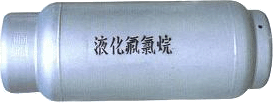Product show
HFC-227ea(Heptafluoropropane)
Identification
Synonyms: 1,1,1,2,3,3,3-Heptafluoropropane (IUPAC); 2H-Heptafluoropropane; HFC-227, R-227; HFC227ea; FM-200; FE-227; Solkaflam 227; MH-227; NAF S 227
CAS No.: 431-89-0
EC No: 207-079-2
Molecular Weight: 170.03
Molecular Formula: C3HF7
Structural Formula: 
b.p. (1 atm): -16.4°C
m.p.: -131°C
Density (16°C): 1.46 g/cm3
Vapor Pressure: 0.45 Mpa
Solubility in water: 260 mg/L
ODP: 0
GWP: 3500
Preparation
On industrial scale, HFC-227ea is prepared by addition reaction between hexafluoropropylene (HFP) and hydrofluoric acid under condition of catalyst: CF3-CF=CF2 + HF → CF3-CHF2-CF3
Application
1) As the first non ozone-depleting alternative for Halon 1301, HFC-227ea (Heptafluoropropane) is used in fire suppression systems in data-processing and telecommunication facilities. Effective fire suppression requires introducing a concentration of the HFC-227ea agent between 6.25% and 9% depending on the hazard being protected. Its NOAEL level for cardiac sensitization is 9%. The US EPA allows concentration of 9% volume in occupied spaces without mandated egress time, or up to 10.5% for a limited time. Most fire suppression systems are designed to provide concentration of 6.25-9%.
In addition, HFC-227ea leaves no residue on valuable equipment after discharge. HFC-227ea contains no chlorine or bromine atoms, presenting no ozone depletion effect, but its global warming potential is high. Its atmospheric lifetime is approximated between 31 and 42 years.
2)HFC-227ea is used as an aerosol propellant in pharmaceutical metered dose inhalers such as those used for dispensing asthma medication.
Specification*
| HFC-227ea purity, % | 99.9 min |
|---|---|
| moisture, mg/kg | 10 max |
| acidity, mg/kg | 1 max |
| non-volatiles, wt % | 0.01 max |
Standard Packaging
1000kgs/926L welded steel cylinder, 13 Cylinders/FCL, or ISO Tank

Risks and Safety Information
Toxicity LC50(4hr, rat), ppm: 800000 min.
HFC-227ea is regulated by UN as non-flammable gas,
UN 3296. Class 2.2
At high temperatures, HFC-227ea (heptafluoropropane) will decompose and produce hydrogen fluoride, presenting sharp, pungent odour, which can be perceived in concentrations far below a dangerous level. Prior to re-entry of a room where HFC-227ea system has been activated to suppress a fire, the atmosphere should be tested.
